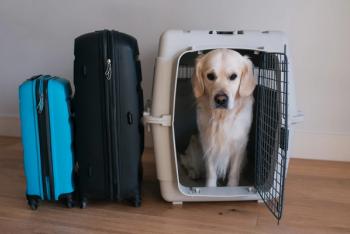
State boards wage war on lay persons practicing veterinary medicine
National Report - State licensing boards are waging war against lay persons performing veterinary medicine, but with attorneys unwilling to prosecute the problem continues to grow. Some believe lay persons are pushing the boundary by offering therapeutic massage, reproductive and chiropractic services.
NATIONAL REPORT— State licensing boards are waging war against lay persons performing veterinary medicine, but with attorneys unwilling to prosecute and little means of enforcement, the problem continues to grow, officials say.
So much so that in November, an Oklahoma law went into effect making it a felony to practice veterinary medicine without a license.
State Rep. Brian Renegar, D-Okla. authored the bill because horses have died from improper sedation during teeth floating, but says most district attorneys wouldn't touch the case when it was a misdemeanor.
"With it being a felony now, they can't turn it down," he says. "Horses in the state of Oklahoma will be a lot safer than they were before."
But equine dentistry is just one area of a nationwide issue. Some believe lay persons are pushing the boundary by offering therapeutic massage, reproductive and chiropractic services and acupuncture. Veterinary boards are reacting accordingly.
Some other key developments:
» The Texas veterinary board is tangled in lawsuits with lay persons fighting for the right to float teeth.
» The Maryland board is being sued by a woman wanting to conduct therapeutic massage for horses.
» Virginia changed its licensing laws allowing lay persons to float teeth, as long as power tools are not used.
» The state of Washington now allows non-veterinarians to massage horses, but only after they complete 300 hours of training.
» Physical therapists and massage therapists in Colorado gained permission to work on animals in July, after the state veterinary board established regulations for the practice.
» Human chiropractors in Oklahoma are able to manipulate animals, if they receive the proper training, but fewer than 20 have done so.
» Idaho is trying to stop non-veterinarians from traveling to farms offering reproductive services, but authorities are not interested in prosecuting.
Renegar, who is a veterinarian, says the Oklahoma Bureau of Narcotics and Dangerous Drugs asked him to carry the bill, which ultimately makes it a felony to practice veterinary, osteopathic and human medicine, as well as dentistry, without a license.
Other states remain entrenched in lawsuits over encroachment into veterinary practice, while others are looking at licensing regulations.
"It's a hot issue all right," says Gregory M. Dennis, legal counsel for the Kansas Veterinary Medical Association (KVMA) and the Missouri Veterinary Medical Association (MVMA) and a charter member of the American Veterinary Medical Law Association (AVMLA.)
Showdown in the Legislature: State Rep. Brian Renegar, D-Okla., pushed legislation making it a felony to practice veterinary medicine without a license.
"There have always been characters around doing these things, but now we're seeing more and more horrific damage done to animals by people who have no idea what they are doing."
Although the practice has been around as long as licensing itself, the issue became a hot button topic in the 1990s in Maryland.
When Maryland amended its laws regarding acupuncture, it took out the word "human" before "body" and opened the door for anyone licensed to perform acupuncture to do so on humans and animals.
"I know there is a thing about saving a buck, but frankly the cost of saving a buck can be quite expensive," Dennis says.
Floating, legal and illegal
Renegar, who operates a mixed-animal practice, says he has a special interest in equine dentistry, and after seeing the damage caused by lay practitioners says the bill he authored offers a bit of vindication for him.
"I do a lot of work for people whose horses have gone to these dentists that I have to redo," Renegar says.
"They don't have the tools to do the back molars, and a lot of times people come in with performance horses that are not performing because the back of the horse's mouth looks like ground hamburger."
Chris Copeland, legal counsel for the Texas Veterinary Medical Association (TVMA), says in the last three to four years equine teeth floating has become a much more highly publicized issue in Texas.
"It came to our attention from equine practitioners saying they're seeing more of it," Copeland says. "The reason they became concerned was because they have seen an increase in people using power tools to float teeth. And once they started seeing power tools being used, they knew most of these animals needed to be sedated. So the concern is, these people are using sedatives and how are they getting them? Licensing is very clear in Texas. Only a veterinarian can dispense or use drugs."
Once the state board began investigating, it determined that, not only were these people floating teeth, but pulling teeth and performing other acts of dentistry, Copeland says.
"At this point, we have a Wild West mentality," Copeland says. "These people are out there providing these services, and no one knows who they are or what their background is. What the board is trying to do is get a handle on it."
While Texas is headed to court, a group of equine dental technicians in Virginia lobbied for legislation to regulate them, with 17 technicians now registered.
The Virginia Board of Veterinary Medicine did not oppose the effort.
"Prior to going to the Legislature they came to the board to ask whether they would be able to do this because there are not enough vets available to go out and do teeth," says Elizabeth Carter, executive director of the Virginia board. "This is horse country."
The board issued guidelines stating dental technicians cannot use motorized tools without a DVM present.
Anyone caught performing equine dentistry, or treating an animal in any way, in Virginia is prosecuted. A first offense is a misdemeanor, but a second offense or any time the procedure is invasive is a felony, Carter says.
Talk of a bill that would remove teeth floating from licensed services in Texas has been kicked around recently and could be introduced after the legislative session starts in January, Copeland adds.
Licensing laws
Officials from the Maryland Veterinary Medical Association (MVMA) say animal health and welfare would be seriously compromised if the woman suing the Maryland Board of Chiropractic Examiners and the MSBVME wins.
"The MVMA believes that complementary and alternative procedures, like therapeutic massage, are quite properly within the scope of the practice of veterinary medicine as currently defined by the Maryland Veterinary Practice Act (MVPA), and they should remain subject to the jurisdiction of the SBVME," the association states.
Massage isn't considered veterinary medicine in Nevada, as long as it is just soft-tissue manipulation and doesn't cross over into physical therapy.
Physical and massage therapists requested the right to work on animals in Colorado and were granted it, after the appropriate rules were created. The law went into effect in July.
"Animal massage and physical therapy for animals are relatively new fields," says Chris Lines, legislative liaison to the Colorado Department of Regulatory Agencies Executive Director's Office. "Work with animals was kept within veterinary medicine, but changes in technology and our understanding of animal physiology created the need for change."
A law enacted in 2007 in Washington allows human massage therapists to work on animals, but only after completing 300 hours of training.
While the statute has been adopted, it has not been implemented and won't be until after the first of the year, according to Judy Haenke, manager of the animal-massage program with the Washington State Department of Health and program manager of veterinary medicine with the Washington State Veterinary Board of Governors.
At least 100 persons are the on list to receive training, according to Haenke.
Massage is regulated in Virginia, but a veterinarian can bring in a human massage therapist to assist.
Cracking licensing laws
In 2000, Oklahoma passed a law enabling the OBVME to work with the state chiropractic board to come up with standard training for chiropractors working on animals.
The need arose after the chiropractic board attempted to amend its regulations, taking out the word human before body, just like what happened with Maryland's acupuncture regulations.
Today, Oklahoma has about 20 licensed animal chiropractors.
Chiropractors not licensed to work on animals can still do so in Oklahoma with the written referral of a veterinarian.
The practice of chiropractic and other services continues elsewhere, with some saying it's because there just aren't enough veterinarians available.
That's a misconception, Dennis says.
"It's just a matter of cost," he says. "A non-licensed person can, or say they can, do it at a cheaper cost. The mind-set that these are only animals ... is very hard to deal with, but veterinary medicine is a profession. It's a licensed profession."
In some instances, there aren't enough veterinarians to provide services, says Dr. James F. Wilson, of Priority Veterinary Medical Consultants in Yardley, Pa.
"It invites equine dentists to pursue that market because it's there, and there is a need," he says. "In other states, the veterinary board immediately challenges (these cases.)"
Acupuncture
In Texas, it is considered "accepted livestock management" for a non-veterinarian to perform farrier services, as well as dehorn and castrate cattle.
But only a veterinarian can perform acupuncture.
While regulations vary from state to state, one thing that remained uniform until recently was that other professions' licensing laws prohibited practicing on animals, Dennis says.
Such was the case with acupuncture in Maryland.
Once the board governing acupuncture in that state sought to change its bylaws removing the word human before body, the state stepped in.
Reproductive services
In Idaho, there is a steady stream of lay people traveling from farm to farm offering reproductive services, even though state law requires veterinarians or employees of veterinarians under the direct supervision of their employer to perform such services.
In one case, someone was crossing county lines offering pregnancy palpation, recalls Karen Ewing, executive director of the Idaho State Board of Veterinary Medicine.
"We turned it over to two different county prosecutors, and both of them refused to prosecute," she says.
Practicing veterinary medicine without a license in Idaho is a misdemeanor.
Even when a violation could involve felony charges, it's nearly impossible to bring a case.
"Veterinarians don't want to give out their names as witnesses," Ewing says. The state has had to fight lay persons doing bull semen evaluations and equine dentistry as well.
The problem of enforcement
Typically, state veterinary boards get the attention of prosecuting attorneys only when lay persons dispense or administer prescription drugs.
No one has been prosecuted under the new Oklahoma law, which went into effect in November, but Cathy Kirkpatrick, OBVME executive director, says it is only a matter of time.
About a dozen people have been sent cease-and-desist letters in Oklahoma for practicing without a license in the past 10 months, and there are likely many more the Oklahoma veterinary board doesn't know about, Kirkpatrick says.
"It's the animal-massage people and the equine teeth-floating people giving us headaches," she says.
The OBVME always has had the authority to issue a citation and $500 fine on the spot for anyone found practicing without a license, which tended to get people's attention, but that didn't deter the practice.
"It's on the rise," Kirkpatrick says. "It's just now, more people are talking and telling us about it."
Nevada has had a similar law on the books at least since the mid-1980s, according to Debbie Machen, executive director of the Nevada State Board of Veterinary Medical Examiners.
It's a felony for non-veterinarians to practice dentistry, physical therapy or chiropractic services on animals and equine teeth-floating falls under the category of dentistry.
The state does register physical therapists and chiropractors to work with animals, but without that registration it is a felony.
Nevada prosecuted two equine dentists in the past two years. Neither received jail time, but they were fined and ordered to stop.
"We have very few people operating outside the law because we basically have zero tolerance," Machen says.
The fight in Texas
This month, the Texas State Board of Veterinary Medical Examiners (TSBVME) will take its case against four individuals before an administrative hearing.
"We've been sued in three different cases and the Institute for Justice is involved in all three," says Nicole Oria, general counsel for the TSBVME.
The TSBVME is able to send cease-and-desist letters when it hears of people practicing veterinary medicine without a license, and for the most part those who receive a letter stop the practice.
"The four who filed suit obviously declined," Oria says. "We had a sit-down. On Dec. 15, we will have an administrative hearing in front of the State Office of Administrative Hearings. We've asked them to decide whether the four were practicing equine dentistry and whether that was in violation of our statute."
"These are the first cases going to administrative hearing," Oria says. But more than 15 other teeth floaters have requested hearings.
Although these services by non-veterinarians do present challenges legally and medically, Wilson advises veterinarians not to overlook opportunities.
"People are looking to expand their business," Wilson says of why this encroachment and cross-over is happening.
"Today, it's the $40 billion pet industry. People see it as a growing industry and a supplement of income for services people already provide."
Newsletter
From exam room tips to practice management insights, get trusted veterinary news delivered straight to your inbox—subscribe to dvm360.





